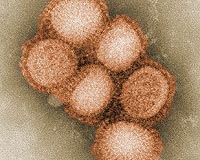| . |  |
. |
Birmingham, UK (SPX) May 18, 2009 A survey of health care workers has revealed that as many as 85% may stay off work if an influenza pandemic did take hold of the country. The results of the survey, published in the open access journal BMC Public Health, suggest that levels of absenteeism may be significantly higher than current official estimates and that 'willingness', rather than 'ability', plays the largest role in health care workers' decisions as to whether to go to work or not. Researchers from the University of Birmingham carried out the survey, in which 1032 healthcare workers responded to questions about the factors that may influence their decisions whether or not to work during an influenza pandemic, and what interventions might be effective in persuading them to work. The research team report that as pandemic influenza is recognised by the Government to be one of the most severe national risks, it is essential that health services are able to manage the major demands that will be placed upon them. Healthcare workers will be at the forefront of the response to a pandemic, and if services are to be provided at sufficient levels, absenteeism from work must be minimized. Responses suggest that the likelihood of working may differ by job type. While doctors were more likely to say they would attend, nurses and ancillary staff were more likely to say they would stay away. The survey shows that willingness to work during a pandemic will be strongly impacted by two types of factors. Firstly, issues relating to family and caring responsibilities. Workers with children or elderly family for whom they are carers would be more likely to be absent from work if influenza illness at home (or the possibility of it) became a worry. Second, issues relating to the work environment itself. These included the possibility of having to take on duties for which a worker felt they had not received training, being asked to work at a different place to normal, working with untrained people, or fears of possible future litigation if mistakes were made while working under abnormal conditions. Measures intended to persuade health care workers to work as normal during a pandemic will need to be tailored to different job types. But as the research suggests, the groups who may be most in need of suitable interventions may also be the least receptive. The team conclude, "Potential levels of absenteeism may be significantly higher than current official estimates, and that absenteeism could be particularly marked amongst certain groups of workers." This research provides important information to assist with planning for a potential influenza pandemic. Share This Article With Planet Earth
Related Links University of Birmingham Epidemics on Earth - Bird Flu, HIV/AIDS, Ebola
 China reports third confirmed swine flu case: state media
China reports third confirmed swine flu case: state mediaBeijing (AFP) May 16, 2009 A third confirmed swine flu case on the Chinese mainland was reported in Beijing late Saturday, state media quoted the Ministry of Health as saying. The official Xinhua news agency said the newly confirmed case of A(H1N1), as the disease is officially known, involved an 18-year-old woman who had been previously reported as a suspected case by the Emergency Management Office of Beijing Munici ... read more |
|
| The content herein, unless otherwise known to be public domain, are Copyright 1995-2009 - SpaceDaily. AFP and UPI Wire Stories are copyright Agence France-Presse and United Press International. ESA Portal Reports are copyright European Space Agency. All NASA sourced material is public domain. Additional copyrights may apply in whole or part to other bona fide parties. Advertising does not imply endorsement,agreement or approval of any opinions, statements or information provided by SpaceDaily on any Web page published or hosted by SpaceDaily. Privacy Statement |